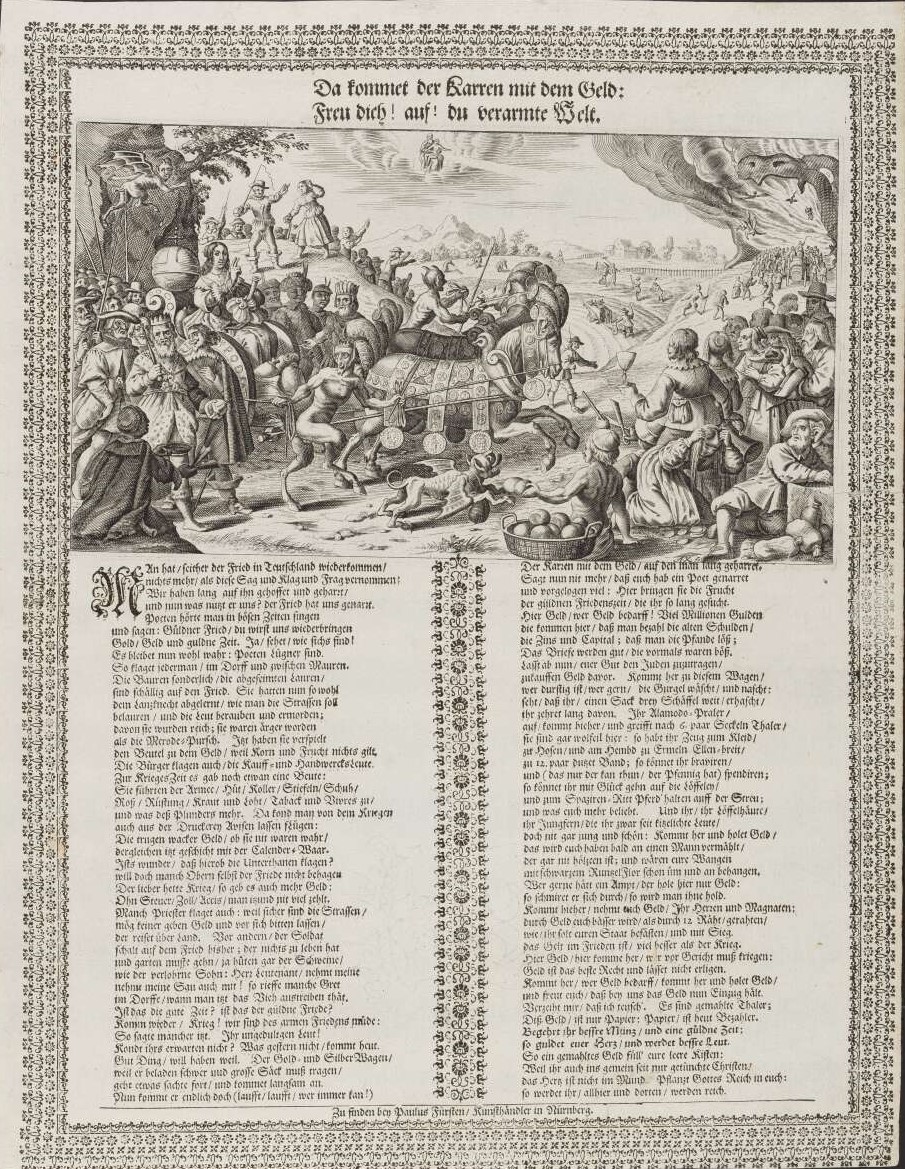Source
Here comes the cart with the money: Rejoice, you impoverished world. Since peace has returned to Germany One has heard nothing / but these words and lamentations and
questions: We have long hoped and waited for him / and now what use is it to us? the peace has fooled us. Poets were heard singing in evil times and say: golden peace / you will bring us back Gold / money and good time. Yes / see / how it turns out! It remains true: poets are liars. So everyone complains / in the villages and within city walls. The peasants in particular / the wily lurkers / are angry with the peace. For they had learned so well from the lansquenet / how to lie in ambush by the roads and rob and murder people: thus they became rich, they had become worse than the marauders. Now they have gambled away the bag with the money / because grain and produce are worth
nothing. The citizens also complain / the merchants and craftsmen. During the war they still made a profit: They provided the army with / hats / collars / boots / shoes / Horses / armor / gunpowder and lead / tobacco and beer / and all the rest of it. About your wars you could have reports printed the print shops: They made plenty of money / even if they were not true/ The same is happening now with the calendars. Is it any wonder that the subjects are complaining about this? Some masters themselves do not like the peace they would rather have war / so there would be more money: Without tax / customs / excise tax / one does not have much to count
these days. Some priests also complain: because the roads are safe / no one who travels overland gives them money and askes them to pray for him. Another/ the soldier curses the peace, he has nothing to live on and had to work in the fields / yes even herding the pigs / like the prodigal son: Mr. Leutenant / take my sow from me too! Thus many women call out in the villages / when the cattle are driven out. Is this the good time? Is this the golden peace? Come back / War! we are tired of this poor peace: So many people say now. You impatient people! Can you not wait? What did not arrive yesterday / comes today. Good things take time. The gold and silver wagon / has to go gently / and arrives slowly because it has to carry heavy loads and large sacks. Now it's finally coming (run / run / whoever can!) The cart with the money / on which one has been waiting for a long
time. Say no more / that a poet has fooled you and lied a lot: Here they bring the fruit the golden time of peace / that you have sought so long Here is money / for whomever needs money! Many millions of
guilders Are coming here / so that one can pay the old debts / the interest and capital to redeem the pledges, Now letters will be good / that before were bad. Now stop taking / your goods to the Jews / to buy money for it. Come here to this cart / those who are thirsty / those who like / to gargle / and snack: see / that you / get yourself / a sack three bushels wide / it will last you a while. You fashionable braggarts / come here / and grab 6 bags of coins / they're quite reasonable here : so you have stuff to wear / for pants / and shirts with sleeves as wide as an arm / for 12 pairs of a dozen ribbons; thus you can impress / and (this only he can do / who has pennies) pay for others; thus you can get lucky in pursuit of a forbidden love / and keep horses in order to go for a leisurely ride; and whatever else you like. And you / you spoon skins
[Löffelhäute] / you maidens / who are indeed easily aroused / but not so young and beautiful: Come here and get money / that will soon have you married to a man / who is not wooden at all; even if your cheeks were covered with black hair and warts all over. Whoever would like to have an office / should get money here: so he can bribe his way / this is how you make yourself popular. Come here, take money / Lords and magnates: money will give you better advice / than 12 councilors could/ how / you should fill positions in your state / and with a
victory money in peacetime / is much better than war. Here money / come here / those who must appear in court: Money is the best law and does not let you down. Come here / those who need money / come here and get money / and rejoice / that money is now coming to us. Forgive me / that I deceive you. The thalers are drawings only; This money / is only paper; paper / is today's payment. If you desire better coin / and a golden time; Then gild your hearts / and become better people. Such painted money fills your empty boxes: Because you are secretly only whitewashed Christians / the heart is not in the mouth. Plant God’s kingdom within
yourselves: then you will be rich in this world and the next. To be found at Paulus Fürst / art dealer in Nuremberg.
Source: Andreas Kohl, Da kommet der Karren mit dem Geld: Freu dich!
auf! Du verarmte Welt, broadsheet, c. 1655. Herzog August Bibliothek
Wolfenbüttel
http://diglib.hab.de/drucke/ie-181/start.htm?image=181